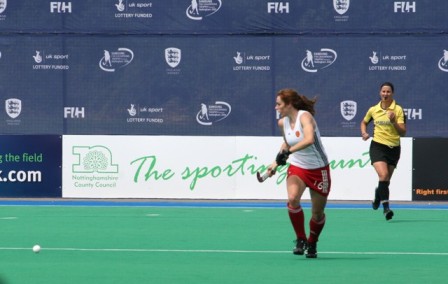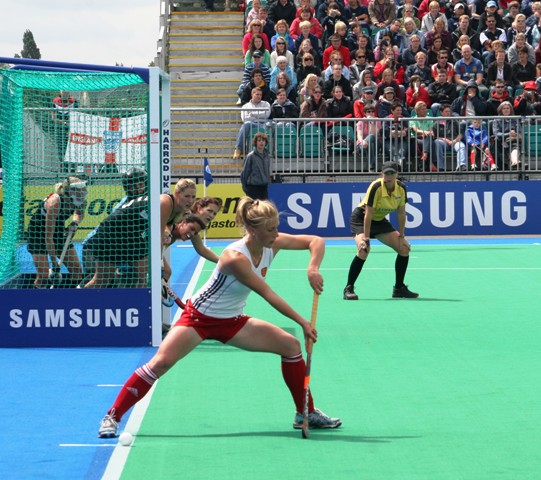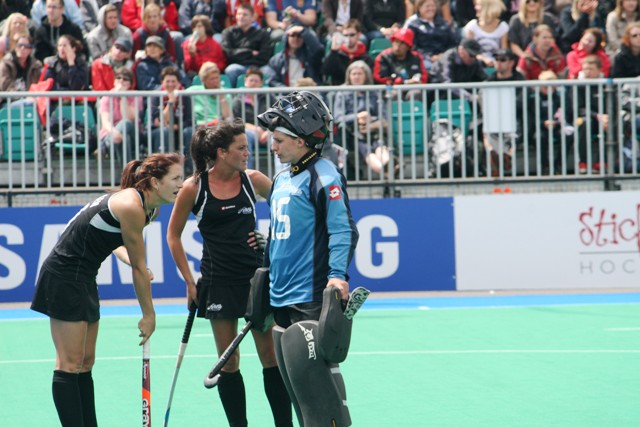
Nottinghamshire: standing behind the Champions Trophy as part of its sporting strategy
Bully for Nottingham
As the inexorable pull of the 2012 Olympics begins to be felt beyond the M25 The Leisure Review went to Nottingham to see how hockey is getting its legacy in first.

Nottinghamshire: standing behind the Champions Trophy as part of its sporting strategy
With the clock ticking on Olympic preparations the only obstacle to an early finish on the various infrastructure projects that will become England’s sporting shop window would seem to be David Cameron’s eagerness to cut every budget he can find in an orgy of economic self-flagellation. Those who fear he might attack London 2012 funding can take comfort, however, in the knowledge that handicapping such a wonderful PR opportunity would never occur to a professional show-off such as the new prime minister. Such consolation is not open to those who long to see the Games’ “soft legacy” transform sport. What the eye doesn’t see the professional politician can ignore and under-fund at will, and anyone looking for central funding to kick in before making the most of the “once in a lifetime opportunity to transform lives” will be see no positive outcomes in their neck of the woods. However, on the positive side of the ledger there are some sports development professionals who began garnering positives some time ago and the green shoots of legacy are starting to see the light in corporation flower beds around the country.
Nottinghamshire has aspirations to be seen as “the sporting county” and, with its county town able to boast two football league clubs, a Test cricket venue, international-standard rowing and canoeing facilities, and a hockey pitch good enough for the best teams in the world to play on, that claim may not be just marketing. Having the facilities is one thing, getting them used is another, as the managers of rotting Olympic venues all over the world will testify, and nothing draws an international tournament quite as readily as the opportunity to get pre-Olympic experience of a host country. The six women’s hockey teams in the Samsung Champions Trophy and the four men’s outfits given the chance to play an invitational event in Nottingham this July will certainly have learned from their experience of an English summer under tournament conditions, gleaning enough knowledge about extended journey times, English hotel breakfasts and the challenge of finding a restaurant table in graduation season in a city with two universities and a medical school to justify the trip. The promise of 2012 reconnaissance, for the organisers as well as the participants, explains why a nation ranked outside the top four was awarded the Champions Trophy, an annual competition for the world’s best teams, but whatever the reasons it came to Nottingham the locals certainly made the most of it.
London 2012 is supposed to be all about legacy and while the phrase “taking the legacy where you can” may not actually be common currency in the business of sports development the concept was certainly in evidence in and around the tournament venue. As hockey development officer Matt Bloor said, “The World Champions Trophy has proved a fantastic mechanism to showcase hockey across Nottinghamshire and promote the county’s thriving club structure. England Hockey ran six WCT pre-event road shows across Nottinghamshire where clubs engaged with members of the public to encourage new participants. The clubs will now run taster sessions prior to the new season through funding from the Community Sports Fund.” In addition to the road shows, the official website listed quicksticks and minis festivals, a masters tournament linked to a Wembley Legends’ tea, coaching master classes and a fixture dating service for visiting squads. There was even the odd bit of ‘guerrilla legacy’ as organisations used the pull of the international hockey to boost numbers at their own quasi-related events.
Nottinghamshire, of course, is blessed with two county-level strategic bodies and Simon Starr, the director of Sport Nottinghamshire, the county sports partnership, gave a view of legacy beyond hockey: “Nottinghamshire has a real ambition to attract world-class events to the city. Not just for the economic impact and the profile that this creates but for the other benefits that major sporting events can deliver. The pride and feelgood factor that the people of Nottinghamshire derive from hosting such prestigious events – the coaches, officials and volunteers who gain so much from being part of the experience, and the inspiration that drives the dreams of our schoolchildren and future players – are key ingredients in providing both a sporting and community development legacy for the city and county.” An example of that feelgood factor was seen at an albeit prosaic level with the event creating such a buzz around the town that even in a deservedly busy Corsican-influenced city centre restaurant called French Living the staff were aware that a serious competition was in town; and hockey isn’t big on Corsica.
There is no doubt that the event was out of the top draw. Ample parking, plenty of circulation space and a garish and noisy ‘village’ with refreshment and entertainment opportunities all spoke of an event organised the modern way. The only black mark for those in charge would be that the gamble not to pay for a roof on the cheap seats did not pay off with rain and wind making spectating a thoroughly unpleasant experience at times. One visiting New Zealander was taken aback that the English summer could be so intemperate; the local organisers should not have been. This, along with the general snootiness of the spectating English public, did detract from the feel of the event. That two coaches conducting a sotto voce shared analysis of a poor game between Holland and Germany were upbraided for “chattering” by a patrician middle-Englander sitting a good two metres away speaks volumes about the socio-economic profile of the sport and the challenge it faces to appeal beyond its traditional heartlands. It is a challenge that seems to have been accepted wholeheartedly by the hockey establishment with the now-requisite loud music, half-time competitions, mascots and even amendments to the rules of the game.
Unfortunately these rules changes seem to be damaging the sport without improving the spectator experience. Sports thinking about changing their traditional ways to accommodate television would do well to pay heed. Hockey is supposed to be played in a spirit of respect, for the opposition and the umpires. The introduction of a right to appeal, accompanied by repeated big-screen replays, has undermined the authority of umpires, who are now questioned and badgered throughout, not just when a decision is directly challenged. Replays can be requested by player and umpire alike, and are, but so esoteric is the game and so protracted the decision-making process that ennui soon descends despite the pulsing music that is no doubt designed to suggest that something cataclysmic is going to happen. Even the players look bored by the time the “decision pending” sign is taken down and play resumes.
Hockey has the makings of a great sport. The new breed of pitch provides a dramatic backdrop for rapid end-to-end action and the skills on show can be replicated by youngsters, or even surpassed if the ball-juggling shown on YouTube is any guide but slavish attempts to court a television audience or to be like soccer will diminish hockey and counter the great work being done to develop the sport at the grass roots. That is not a legacy policy any governing body should be pursuing.
The Leisure Review, August 2010
© Copyright of all material on this site is retained by The Leisure Review or the individual contributors where stated. Contact The Leisure Review for details.
Download a pdf version of this article for printing

England: demonstrating a straight-stick approach

New Zealand get a feel for playing conditions before the Olympic Games